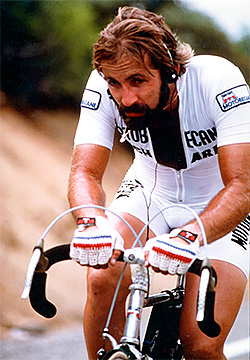Life’s Score

The author in the 1984 Race Across America (RAAM), crossing from Arizona into Utah through the Virgin River Gorge.
Among cycling aficionados of my generation, Peter Yates’ and Steve Tesich’s 1979 film Breaking Away was a welcome vehicle to convey the elegance and complex strategy of our sport to an American audience largely oblivious to its beauty and nuances. Of course, like most sports films, it was a metaphor for something deeper, in this case a coming of age story of a young man struggling to break away from the provincialism of family and friends, along with a morality tale about how everyone lies a little and some people cheat a lot.
In Knowing the Score, King’s College philosopher David Papineau uses specific sports as metaphors for and lessons about many of the most important and contentious issues in philosophy and life. In his chapters on cycling, for example, he confesses his ignorance while watching the 2012 Olympic road race as to why four women cyclists from different countries would work together after their break away from the peloton. Papineau finds an answer in game theory, the analysis of competition and cooperation between rational actors in a conflict situation. The prisoner’s dilemma model is the most famous example: you and another prisoner are arrested for a crime with the following options: (1) If both of you remain silent then you each receive one year in jail; (2) If you confess but the other person does not, then you go free and he gets three years; (3) If the other prisoner confesses and you don’t, then you receive the three-year penalty while he goes free; (4) If you both confess then you each get two years. What should you do? Research shows that when the game is played just once, or over a fixed number of rounds without the players being allowed to communicate, defection (confessing) is the common strategy. But when the game is played over an unknown number of rounds the most common strategy is “tit-for-tat,” where you begin by cooperating and then do whatever the other player does. Even more cooperation can be induced in a “Many Person Dilemma” in which one player interacts with several other players, and in which players are allowed to accumulate experience with the other players in order to establish trust. Here cooperation trumps competition, selflessness overcomes selfishness.
We can see how this plays out in a road race. Cyclists drafting one another provide a significant savings in energy (as much as 40 percent) and increase in speed, so solo breakaways are very unusual and almost always fail. Drafting in the middle of the pack the entire race is very efficient, but then you have to sprint for the win against a hundred other competitors, some of who specialize in sprinting. Ideal is a small breakaway with, say, four riders, allowing for efficient enough drafting to conserve energy and maintain speed, and you only have to beat three others to win. So it pays for each of the four racers to cooperate with one another until the very end. If one rider “defects” in the game theoretic model and refuses to take a pull at the front, the others will punish her by various means, verbally or otherwise. Occasionally what happens in the final kilometer is that everyone in the break away refuses to pull through in order to conserve energy for the sprint and the group gets caught by the hard-charging peloton, an example of selfishness overcoming selflessness to the detriment of all. Knowing this can happen discourages early collective defection and keeps the provisional mutualism going.
Such conflicts between self-interest and group-interest are common, in sports and in life. Cold War strategies between the US and USSR are examples of game theoretic models that worked to prevent nuclear holocaust, as are the strategic moves today by the US, China, and South Korea to contain North Korea’s nuclear weapons program while recognizing it’s desire for defense. Like nations, humans are autonomous selfish beings who are also altruistic social creatures, so finding the right balance between these competing motives lurks behind most interactions. Individual European nations desiring autonomy versus the collective benefits of being in the EU is an example of these tensions, as is US economic nationalism versus the advantages of international trade. Climate change is a collective action problem that must contend with breakaway nations like China and India who need cheap fossil fuel energy to become fully industrial economic powerhouses. Who are we in the peloton of developed nations to tell the developing nations in the breakaway to slow down?

The author in the 1983 Race Across America between Prescott and Flagstaff, Arizona (listening to music via headphones on a “Sony Walkman”).
Each chapter in Papineau’s engaging book deconstructs a philosophical problem along these lines. Political obligations in a society and professional fouls in an athletic contest; civil society and sporting eligibility; sporting nations and political geography (of which George Orwell once commented that sport “is war minus the shooting”); nature and nurture in athletic performance and life (gifted athletes have gifted children, but not equally so); Coase’s Theorem in economics applied to sports; Noam Chomsky and the nature of sports (the linguist “thinks sport is nothing but a capitalist trick,” as only a non-athletic egghead could conclude); to name but a few of the integrative topics. “It is tempting to confuse the insulation of sports with a lack of significance,” Papineau writes. “We are too quick to conclude, just because sports don’t matter to other things, that they don’t matter at all. But this doesn’t mean that it is not important and valuable in its own right.”
“Football is not a matter of life and death,” Papineau quotes the Liverpool soccer manager Bill Shankly. “It’s much more important than that.” That may be hyperbolic wit, but athletic contests are not just another form of play. They are the very embodiment of human striving that brings meaning to life. Most people want more than just a happy and contented existence. We want challenges to face and obstacles to overcome. Our ancestors got more of those from daily life than we do today, so all the more need we have for our artificial trials, and all the more importance of knowing the score.


![Knowing the Score: What sports can teach us about philosophy (and what philosophy can teach us about sports) [BOOK COVER]](https://www.skeptic.com/eskeptic/2017/images/17-08-09/knowing-the-score-cover.jpg)